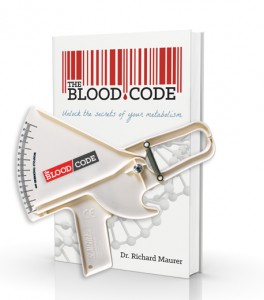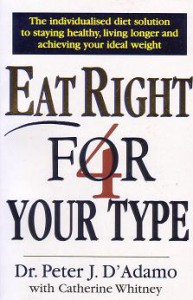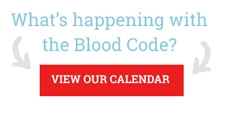One of the more common questions I hear about The Blood Code is, “How does it differ from the Blood Type Diet?” As a colleague of Dr. Peter D’Adamo, I am very familiar with his work, “Eat Right for Your Type” which was finalized from a book by his father and fellow physician, Dr. James D’Adamo.
 I wrote “The Blood Code: Unlock the Secrets of Your Metabolism” in 2014 as a self-help guide that walks the line between science and practical dietary and nutritional advice. Most people get dietary advice from some group or individual that tries to fit everyone you into a one-size-fits-all program. This strategy will usually fail miserably. For example—if I recommend that you eat a whole grain rich, vegetarian diet, but you are prone to abdominal weight gain and carry the type 2 trait—I will make your life shorter and worse.
I wrote “The Blood Code: Unlock the Secrets of Your Metabolism” in 2014 as a self-help guide that walks the line between science and practical dietary and nutritional advice. Most people get dietary advice from some group or individual that tries to fit everyone you into a one-size-fits-all program. This strategy will usually fail miserably. For example—if I recommend that you eat a whole grain rich, vegetarian diet, but you are prone to abdominal weight gain and carry the type 2 trait—I will make your life shorter and worse.
Both Doctor D’Adamo and my programs avoid the trap of one-size-fits-all recommendations. The Blood Type  Diet uses your ABO blood type to make assumptions about many non-blood type related conditions. I will note that for me, there is a major problem of heterozygousness. Big word, sorry, but it is when a recessive trait is carried but not seen in the blood type test. For example, I am blood type “A”, which is a dominant blood type. But my mother is blood type “o”, which is recessive—so I am truly blood type “Ao”. Therefore, I don’t fit into the tidy order of the blood type system. And of course your blood type does not change from the day you are born, so the assumption is that the rules of your blood type diet stay throughout your life.
Diet uses your ABO blood type to make assumptions about many non-blood type related conditions. I will note that for me, there is a major problem of heterozygousness. Big word, sorry, but it is when a recessive trait is carried but not seen in the blood type test. For example, I am blood type “A”, which is a dominant blood type. But my mother is blood type “o”, which is recessive—so I am truly blood type “Ao”. Therefore, I don’t fit into the tidy order of the blood type system. And of course your blood type does not change from the day you are born, so the assumption is that the rules of your blood type diet stay throughout your life.
The Blood Code diet is based upon the metabolic blood test results here and now in your life. There is a Progress Panel, a Discovery Panel, and an optional Thyroid Activity Panel, that give you the guidance to steer your dietary and nutritional habits toward a wildly healthier present and future. After making changes, blood test results check your progress. And yes, as you age, your diet will need to change with you. I have inherited a trait toward type 2 diabetes—I fully expect that my dietary carbohydrate intake will need to lower as I age. But ultimately I will know for certain with my lab results—if my Blood Code Progress Panel shows evidence of insulin resistance I’ll need to dial up my Metabolic Recovery Exercise and get better at my low carb high fat diet, aka. My Blood Code Diet.
My take home to you: Avoid one size fits all recommendations for your health—regardless of whether it is your doctor, a best selling author or popular health expert. Take the challenge and learn a little of the science that makes you do what you do and be who you are. Unlock your healthiest potential, but don’t believe me, check it out yourself.




Comments are closed.